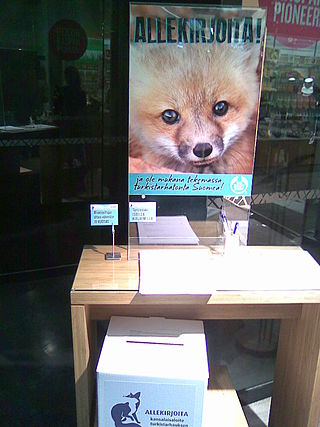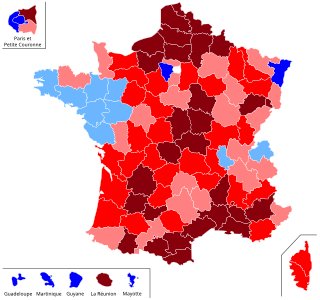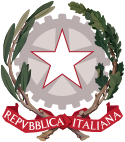
A referendum is a direct vote by the electorate on a proposal, law, or political issue. This is in contrast to an issue being voted on by a representative. This may result in the adoption of a new policy or specific law, or the referendum may be only advisory. In some countries, it is synonymous with and also known as plebiscite, votation, popular consultation, ballot question, ballot measure, or proposition.

A popular initiative is a form of direct democracy by which a petition meeting certain hurdles can force a legal procedure on a proposition. The hurdles the petition has to meet vary between countries, typically signatures by a certain number of registered voters.

The regions of Italy are the first-level administrative divisions of the Italian Republic, constituting its second NUTS administrative level. There are twenty regions, five of which are autonomous regions with special status. Under the Constitution of Italy, each region is an autonomous entity with defined powers. With the exception of the Aosta Valley and Friuli-Venezia Giulia (2018–2020), each region is divided into a number of provinces.
A constitutional amendment is a modification of the constitution of a polity, organization or other type of entity. Amendments are often interwoven into the relevant sections of an existing constitution, directly altering the text. Conversely, they can be appended to the constitution as supplemental additions, thus changing the frame of government without altering the existing text of the document.

Latvia elects on the national level a legislature. The Saeima has 100 members, elected for a four-year term by proportional representation with a 5% threshold. An unmodified Sainte-Laguë method is used to allocate seats. The parliamentary elections are held on the first Saturday of October. Locally, Latvia elects municipal councils, consisting of 7 to 60 members, depending on the size of the municipality, also by proportional representation for a four-year term.

This is a list of referendums related to the European Union, or referendums related to the European Communities, which were predecessors of the European Union. Since 1972, a total of 48 referendums have been held by EU member states, candidate states, and their territories, with several additional referendums held in countries outside the EU. The referendums have been held most commonly on the subject of whether to become a member of European Union as part of the accession process, although the EU does not require any candidate country to hold a referendum to approve membership or as part of treaty ratification. Other EU-related referendums have been held on the adoption of the euro and on participation in other EU-related policies.

A referendum, in the Italian legal system is a request directed to the whole electorate to express their view on a determined question. It is the main instrument of direct democracy in Italy.

National-level elections in Italy are called periodically to form a parliament consisting of two houses: the Chamber of Deputies with 400 members; and the Senate of the Republic with 200 elected members, plus a few appointed senators for life. Italy is a parliamentary republic: the President of the Republic is elected for a seven-year term by the two houses of Parliament in joint session, together with special electors appointed by the Regional Councils.

A referendum on the Treaty establishing a Constitution for Europe was held in France on 29 May 2005 to decide whether the French government should ratify the proposed constitution of the European Union. The result was a victory for the "no" campaign, with 55% of voters rejecting the treaty on a turnout of 69%.

The Federal Constitution of the Swiss Confederation of 18 April 1999 is the third and current federal constitution of Switzerland.
Five nationwide popular referendums were held in Italy on 8 November 1987, with three questions about nuclear energy after the Chernobyl disaster, and two questions about justice. Voting day had been postponed by six months, according to the Italian Constitution, because of the snap election of spring.

A nationwide referendum was held in Moldova on 5 September 2010 on whether or not the country should amend the Constitution of Moldova to return to direct popular election of the president. Since 2001, the president had been indirectly elected by Parliament, with a supermajority of 61 seats required for election. The voters are asked to answer the following question: "Would you agree with the Constitutional amendment, which would allow the election of the President of the Republic of Moldova by the entire population?" Voters chose one of the proposed options: "Yes (for)" or "No (against)". Of those who had cast their vote, 87.83% chose "Yes". However, the referendum did not pass because only 30.29% of voters turned out, short of the necessary 33% for the referendum to be considered valid.
Four referendums were held in Switzerland during 1903. The first was held on 15 March on a federal law on tariffs, and was approved by 59.6% of voters. The second, third and fourth were all held on 25 October concerning an amendment to the federal criminal law, a popular initiative on Swiss residents electing the National Council and an amendment to article 32bis of the constitution. All three were rejected by voters.
Three referendums were held in Switzerland during 1908. The first two were held on 5 July on amending the federal trade law and on banning absinthe. Both were approved by a majority of voters and cantons. The third was held on 25 October on adding article 24bis to the constitution, concerning hydroelectricity and electricity. It was also approved by a majority of voters and cantons.
Four referendums were held in Switzerland during 1923. The first two were held on 18 February on protective custody and a federal resolution on relations with France over the former free trade area of Haute-Savoie. The third was held on 15 April on a popular initiative "for the ensuring of people's rights in questions regarding tariffs", whilst the fourth was held on 3 June on amending articles 31 and 32bis of the constitution regarding alcohol. All four were rejected by voters.
Four referendums were held in Switzerland during 1939. The first two were held on 22 January on a popular initiative on civil rights and a federal resolution on the restricted use of the urgency clause in the constitution. The third was held on 4 June on a constitutional amendment regarding the funding for government policies on defence and unemployment, and was approved by voters. The fourth was held on 3 December on a federal law on the employment status and insurance for federal civil servants, and was rejected by voters.
Three referendums were held in Switzerland during 1947. The first was held on 18 May on a popular initiative for "economic reform and rights concerning work", and was rejected by voters. The second and third were both held on 6 July on revising the articles of the federal constitution covering the economy and a federal law on aged and bereavement insurance. Both were approved by voters.
Four referendums were held in Switzerland during 1949. The first two were held on 22 May on revising article 39 of the federal constitution concerning the Swiss National Bank and a federal law amending a 1928 law on measures against tuberculosis, with both rejected by voters. The third was held on 11 September on a popular initiative "for the recurrence to direct democracy" and was narrowly approved. The final one was held on 11 December on a federal law to amend the employment status of federal civil servants, and was also approved.
Seven referendums were held in Switzerland during 1958. The first was held on 26 January on a popular initiative "against the abuse of economic power", concerning unfair competition, and was rejected by voters. The second was held on 11 May on the federal budget, and was approved by voters. The third and fourth were held on 6 July on introducing a new section 27ter to the constitution concerning films, and a petition to improve the road network, both of which were approved. The fifth referendum was held on 26 October on instituting a 44-hour working week, and was rejected by voters. The final two were held on 7 December on a constitutional amendment on gambling and approving a treaty with Italy on a hydroelectric power scheme on the River Spöl, with both approved.
A referendum is a direct vote in which an entire electorate is asked to either accept or reject a particular proposal. This article summarises referendum laws and practice in various countries.










